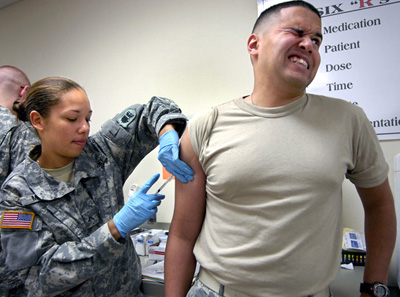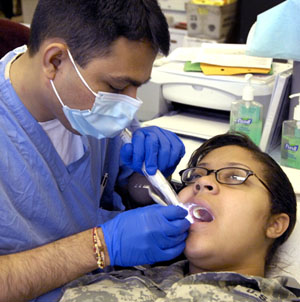 |
 |
The Army put its promise into practice Nov. 27-28 as nearly 300 troops from the 50th Infantry Brigade Combat Team underwent pre-mobilization medical processing at the Fort Dix Joint Readiness Center.
Conducting such processing during pre-mobilization preparations comes as a result of a policy issued earlier this year that limits Reserve Component mobilizations to no more than one year, inclusive of time spent at the mobilization station, in-theater, and at the demobilization station.
To meet this timeline, units are now required to accomplish certain tasks formerly completed at mobilization stations while still in a pre-mobilization, Reserve Component status.
“They’ve shifted a lot of the pre-mobilization training to the units,” explained Col. Steve Ferrari, 50th Infantry Brigade Combat Team (IBCT) commander. “We’re reducing some of the time we’d have to spend at (the mobilization station).”
“The more training we can get done in pre-mobilization, the more time we can spend in-theater,” said Ferrari.
Pre-mobilization training can include Soldier Readiness Processing, the Combat Lifesaver course, weapons qualification, driver training, and medical screening, among other activities.
For the 50th IBCT Soldiers to meet the pre-mobilization requirements for deployment, New Jersey Army National Guard leadership partnered with Fort Dix mobilization leaders to meet the objectives. Under that plan, Fort Dix mobilization resources — such as the Joint Readiness Center (JRC) — and the New Jersey National Guard’s Joint Training and Training Development Center are being used to expedite the process.
“As the mobilization time prior to deployment has been condensed, every opportunity to train during the mobilization phase becomes precious,” said Col. Judith Robinson, Commander, Walson Medical Support Element.
"These pre-mobilization activities give back some of that precious time to training.” The 50th IBCT Soldiers were offered eye exams, immunizations, blood work, and other medical processing during their two days at the Joint Readiness Center. Additional dates for the remaining Soldiers in the brigade are scheduled for the coming months.
“As the 50th IBCT is a locally based unit, we have the proximity that makes this possible with minimum cost to the unit and the U.S. Army,” Robinson explained. “Also, as a mature JRC site, we are able to handle large numbers in a short period of time, making it a very efficient means to accomplish this vital processing.”
“Going through the pre-mobilization medical processing here at Fort Dix is allowing the 50th IBCT Soldiers to be better prepared when they actually mobilize next year,” said Robinson. “The time spent now getting the majority of their medical processing completed will give them more time for training when they mobilize.”
 |
"Conducting pre-mobilization medical screening also provides the commanders with more information on the condition of their Soldiers,” Robinson added. “It gives them early knowledge of issues that may preclude the deployment of a Soldier, and allows them to find proper replacements or make adjustments early in the deployment planning cycle.” “And for those Soldiers who need further care before deployment,” she continued, “it gives them an opportunity to start that care now, and then be able to deploy on schedule with their units.” “It’s a win-win for the unit and the individual Soldier,” she said. |
Although the 50th IBCT is conducting pre-mobilization training at Dix, the unit is set to spend two months mobilizing through Fort Bliss, Texas.
“Fort Dix could (mobilize) us, but they have a limit on the amount of Soldiers they can bring in at one time,” explained Ferrari.
Approximately 3,100 Soldiers — including a total of 2,600 from the Garden State — are set to deploy with the 50th IBCT this summer. They will be tasked with security forces and detainee operations missions in Iraq. Fifteen companies within the brigade will provide internal and external security at several prisons.
“Fort Bliss is considered the premier detainee operations training site in the Army,” said Ferrari. “It’s very realistic training.”
 |
Volume 33 Number 5 Staff / Information | |
 |